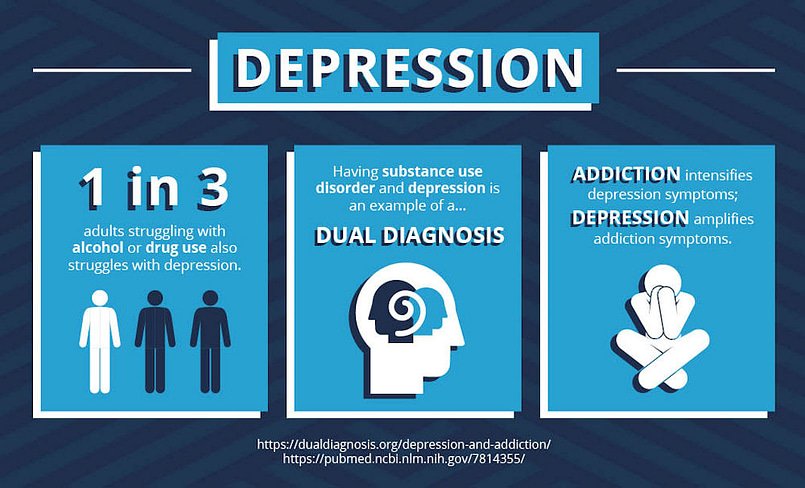Do you need mental health treatment in Portland? Call us today at (866)262-0531 for more information.
While the root causes of depression and anxiety may not always be clear, it’s undeniable that these mood disorders significantly impact individuals across the developed world. At Crestview, our clinicians specialize in providing support and treatment for those battling the debilitating effects of depression and anxiety. Our comprehensive approach encompasses evidence-based therapies and interventions tailored to address each client’s unique needs. Whether you’re struggling with major depressive disorder, treatment-resistant depression, or anxiety disorders, our team of psychiatrists, clinical psychologists, and counselors is here to guide you toward lasting relief and a satisfying life. Learn more about our depression, anxiety, and bipolar treatment programs, and take the first step towards overcoming depression and reclaiming your mental health and happiness.

Healing Begins Here

SIGNS AND SYMPTOMS OF DEPRESSION DISORDER
Recognizing the signs of depression is crucial for seeking timely help and support. Here are some common indicators:
- Persistent feelings of sadness or hopelessness
- Loss of interest in activities once enjoyed
- Changes in appetite or weight
- Difficulty concentrating or making decisions
- Fatigue or loss of energy
- Irritability or restlessness
- Physical symptoms such as headaches, digestive issues, or body aches
- Thoughts of self-harm or suicide
If you or someone you know is experiencing several of these symptoms, it may be indicative of clinical depression or anxiety disorders. Seeking professional help is essential for proper diagnosis and treatment.
TAKING MEDICATION FOR DEPRESSION
- Manic episodes, characterized by heightened energy levels, impulsivity, and racing thoughts
- Difficulty balancing mood swings or extreme highs and lows
- Development of phobias or compulsive behaviors
- Persistent insomnia despite lifestyle adjustments such as diet and exercise
At Crestview Recovery, we understand the complexities of mental health disorders and the importance of personalized treatment approaches. If you’re experiencing any of these symptoms or have concerns about your medication regimen, we encourage you to reach out to our team. We’re here to provide the support, guidance, and answers you need to navigate your journey toward mental wellness.

WHAT IS A DEPRESSION TREATMENT PROGRAM?

THERAPY IN A DEPRESSION TREATMENT PROGRAM
In individual therapy for depression, clients can expect a compassionate and understanding environment where they can openly discuss their symptoms and struggles with a therapist or counselor. Through evidence-based modalities like cognitive-behavioral therapy (CBT), dialectical behavior therapy (DBT), or psychodynamic therapy, therapists or counselors work collaboratively with clients to address underlying causes and manage symptoms effectively. Sessions may involve exploring negative thought patterns, developing self-awareness, improving self-esteem, and learning coping mechanisms to navigate challenges. Therapists and counselors emphasize creating a supportive and non-judgmental space to foster healing, empowerment, and lasting change in clients’ lives.
Group therapy for depression offers a supportive and empathetic environment where individuals can connect with others facing similar challenges. Led by a trained therapist, sessions focus on exploring shared experiences, providing mutual support, and learning coping strategies. Through evidence-based approaches such as cognitive-behavioral therapy (CBT) or dialectical behavior therapy (DBT), participants gain insight into their thoughts and behaviors while receiving feedback and encouragement from peers. Group therapy emphasizes building interpersonal skills, fostering a sense of belonging, and reducing feelings of isolation commonly associated with depression. It provides a valuable opportunity for clients to share their journey, gain perspective, and develop coping mechanisms to manage symptoms effectively.
Cognitive-behavioral therapy is a set of therapeutic procedures that address the role of particular thoughts and behavior patterns that interfere with mental health. CBT helps people reshape their actions and feelings by modifying thought patterns and self-perception. Taking the time to examine our thoughts as they relate to our self-esteem and behavior can help people cope with depression in healthy ways.
Dialectical behavioral therapy uses conversation, group work, skills training, individual therapy, and self-monitoring to help people develop healthy emotional responses. This therapy model uses a combination of skills training and relationship building between the patient and clinician to help manage strong emotions and difficulty controlling behavior.
Holistic therapy for depression takes a comprehensive approach to mental health, addressing not only the symptoms but also the underlying causes of depression. At Crestview Recovery, our holistic therapy programs integrate evidence-based treatments with complementary activities to promote overall well-being. These activities may include individual therapy sessions to delve into the root causes of depression, group therapy to foster a supportive environment, and self-awareness practices to enhance emotional resilience. Additionally, we offer mindfulness-based activities such as meditation and yoga to promote relaxation and reduce anxiety symptoms. Our emphasis on holistic therapy ensures that clients receive comprehensive care, addressing the mind, body, and spirit in their journey towards overcoming depression and achieving lasting change and relief.
Trauma therapy for depression focuses on addressing past traumatic experiences that may contribute to the development or exacerbation of depressive symptoms. At Crestview Recovery, our trauma-informed approach emphasizes understanding and processing the effects of trauma on mental health. Through evidence-based techniques such as Eye Movement Desensitization and Reprocessing (EMDR) and cognitive-behavioral therapy (CBT), our therapists help clients explore and resolve underlying trauma while learning coping mechanisms to manage depressive symptoms. By addressing trauma alongside depression treatment, we strive to provide holistic care that promotes healing and lasting relief for our clients.
TRAUMA-INFORMED CARE (TIC)
- Direct exposure
- Witnessing violence (in person)
- Learning about a traumatic event affecting a close family member or friend
- Experiencing repeated, extreme, or pervasive trauma
The relationship between trauma and depression is a complicated one. A trauma-informed therapist or counselor can help you recognize when an event triggers an inappropriate emotional response due to past traumatic experiences.

ADDRESSING TREATMENT RESISTANT DEPRESSION IN PORTLAND
CAUSES OF CO-OCCURRING DISORDERS WITH DEPRESSION
Environmental stressors and adverse childhood experiences may exacerbate susceptibility to co-occurring disorders, leading individuals to self-medicate with substances as a way to alleviate depressive symptoms. At Crestview Recovery, our comprehensive approach addresses these complex contributors, offering tailored treatment plans and evidence-based therapies to promote healing and recovery from co-occurring conditions.
DUAL DIAGNOSIS AND DEPRESSION
TYPES OF MOOD DISORDERS
Mood disorders encompass a range of conditions, including major depressive disorder, bipolar disorder, and various anxiety disorders. In Portland, our clinicians specialize in diagnosing and treating these mood disorders, offering individualized care to help clients manage symptoms and achieve mental health and stability.
While it is common for people to use the terms depression and bipolar interchangeably, these mental health conditions are different and require different types of treatment. People with bipolar disorder do experience depression, but they also experience periods of elevated emotional and physical intensity known as mania. To learn more about bipolar treatment at our Portland mental health center, contact a therapist at Crestview today.
Cyclothymia is a mood disorder characterized by fluctuating mood swings between hypomania and mild depression, though less severe than those seen in bipolar disorder. Individuals with cyclothymia may experience periods of elevated mood (hypomania) accompanied by increased energy, impulsivity, and decreased need for sleep, followed by periods of mild depression marked by feelings of sadness, hopelessness, and low energy.
Hypomania is a mood state characterized by elevated, expansive, or irritable mood and increased energy and activity levels that are not as severe as full-blown mania. Individuals experiencing hypomanic episodes may engage in risky behaviors, have racing thoughts, and exhibit inflated self-esteem. While hypomania can be pleasurable and increase productivity, it can also disrupt daily functioning and relationships if left untreated.
Disruptive Mood Dysregulation Disorder (DMDD) is a mood disorder characterized by severe and recurrent temper outbursts that are out of proportion to the situation, along with persistent irritability or anger. Children and adolescents with DMDD often struggle with regulating their emotions and may experience significant impairment in multiple areas of functioning, including home, school, and social environments.
Persistent Depressive Disorder (PDD), formerly known as dysthymia, is a chronic form of depression marked by persistent feelings of sadness, hopelessness, and low self-esteem. Unlike major depressive disorder, the symptoms of PDD are less severe but last for a longer duration, typically lasting for at least two years in adults and one year in children or adolescents. Individuals with PDD may find it challenging to experience joy or satisfaction in life and may have difficulty functioning in daily activities.


SEEK TREATMENT AT CRESTVIEW RECOVERY
At Crestview Recovery, we specialize in mental health treatment for those struggling with depression. You can join our inpatient mental health program and if you have question about treatment, such as what to bring or how long treatment last, reach out to our team. Our extensive treatment options include group therapy, individual therapy, holistic therapy, yoga therapy, and family therapy. Contact us to explore our innovative depression treatment programs and embark on a journey toward healing and recovery.






















